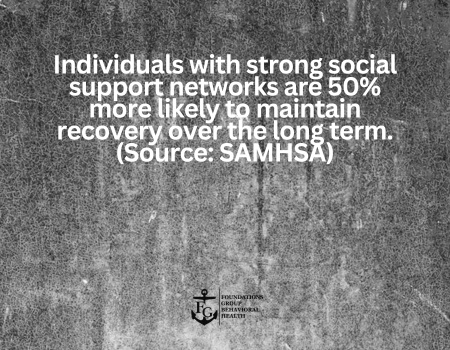Recovery from mental health conditions and co-occurring disorders is not a one-time event but a lifelong process. While the initial phases of treatment focus on symptom stabilization and crisis management, long-term recovery involves building a life of stability, fulfillment, and resilience. It requires a proactive commitment to personal growth, emotional health, and the creation of supportive systems that foster sustained well-being.
At Foundations Group Behavioral Health, we offer a range of evidence-based treatment programs, including Psychiatric Day Treatment, Half-Day Treatment Programs, and Outpatient Mental Health Programs, designed to support individuals in achieving and maintaining long-term recovery.
What Does Long-Term Recovery Mean?
Long-term recovery encompasses the ongoing process of managing mental health conditions, achieving emotional stability, and developing a fulfilling life. Unlike short-term treatment that focuses on immediate symptom relief, long-term recovery emphasizes holistic well-being, personal growth, and the prevention of relapse.
Key Elements of Long-Term Recovery
- Emotional Resilience: The ability to navigate challenges and setbacks without becoming overwhelmed.
- Personal Growth: Continuous self-improvement and the pursuit of meaningful goals.
- Healthy Relationships: Building and maintaining supportive connections.
- Lifestyle Balance: Incorporating habits that support physical, mental, and emotional health.
Steps to Achieve Long-Term Recovery
1. Begin with Comprehensive Treatment
The foundation of long-term recovery lies in receiving professional care tailored to your specific needs. At Foundations Group Behavioral Health, we offer programs that provide the tools and support needed to establish a strong start to recovery:
- Psychiatric Day Treatment: Intensive, structured care for individuals with significant mental health challenges.
- Half-Day Treatment Programs: Flexible options for those balancing recovery with personal or professional responsibilities.
- Outpatient Mental Health Programs: Ongoing therapy and support for individuals transitioning from intensive care or managing mild to moderate symptoms.
2. Address Co-Occurring Disorders
Many individuals with mental health conditions also struggle with substance use disorders or other co-occurring issues. Integrated care is essential for addressing both conditions simultaneously, ensuring a comprehensive approach to recovery.
- Co-Occurring Disorder Treatment Program: Provides specialized care for individuals managing multiple conditions, focusing on the interconnected nature of mental health and substance use.
3. Develop a Support Network
Recovery is not a solo journey. Building a network of supportive individuals can provide accountability, encouragement, and a sense of belonging.
- Family and Friends: Engage with loved ones who understand and respect your recovery process.
- Peer Support Groups: Join groups where you can share experiences and gain insights from others on similar journeys.
- Professional Support: Continue therapy or counseling to address ongoing challenges and foster growth.
4. Create Healthy Routines
Consistency is key to maintaining long-term recovery. Establishing daily routines provides structure and stability, reducing the risk of relapse.
- Sleep Hygiene: Aim for 7-9 hours of sleep each night to support mental and physical health.
- Balanced Nutrition: Incorporate whole, nutrient-dense foods to fuel your body and mind.
- Regular Exercise: Engage in physical activity to boost mood, reduce stress, and improve overall well-being.
5. Practice Emotional Regulation
Learning to manage emotions is a cornerstone of recovery. Emotional regulation techniques can help you navigate stress, triggers, and setbacks without reverting to unhealthy coping mechanisms.
- Mindfulness Practices: Engage in meditation, deep breathing, or grounding exercises to stay present.
- Therapeutic Techniques: Participate in therapies like Cognitive Behavioral Therapy (CBT) or Dialectical Behavior Therapy (DBT) to develop coping skills and emotional awareness.
- Journaling: Reflect on your emotions and track your progress to identify patterns and triggers.
6. Set Meaningful Goals
Having a sense of purpose is essential for long-term recovery. Setting achievable, meaningful goals provides motivation and direction.
- Short-Term Goals: Focus on small, immediate steps, such as attending therapy sessions or practicing self-care daily.
- Long-Term Goals: Work toward larger aspirations, such as pursuing education, career advancement, or personal milestones.
- Celebrate Progress: Acknowledge and reward yourself for your achievements, no matter how small they may seem.
Challenges in Long-Term Recovery
While long-term recovery is a rewarding journey, it is not without challenges. Being aware of potential obstacles can help you navigate them more effectively.
1. Managing Triggers
Triggers—situations, emotions, or memories that evoke distress—are common in recovery.
- Identify Your Triggers: Keep a journal to track patterns and recognize what causes emotional discomfort.
- Develop Coping Strategies: Work with a therapist to create a plan for managing triggers.
- Create a Safe Environment: Remove or minimize exposure to triggering situations whenever possible.
2. Preventing Relapse
Relapse is not uncommon in recovery but can be an opportunity for growth and self-reflection.
- Maintain Regular Therapy: Consistent sessions with a therapist or counselor provide ongoing support.
- Monitor Emotional Health: Use tools like mood trackers to identify early signs of emotional distress.
- Reach Out for Help: Lean on your support network when you feel vulnerable or overwhelmed.
3. Combating Stigma
Stigma surrounding mental health can make it difficult to seek help or discuss your recovery journey.
- Educate Yourself and Others: Challenge misconceptions by learning and sharing accurate information about mental health.
- Join Advocacy Groups: Participate in initiatives that promote mental health awareness and acceptance.
- Practice Self-Compassion: Remind yourself that recovery is a courageous and worthwhile pursuit.

The Role of Professional Support in Long-Term Recovery
Professional care plays a crucial role in maintaining long-term recovery. At Foundations Group Behavioral Health, we offer programs designed to provide ongoing support and foster resilience.
1. Psychiatric Day Treatment
- Focus: Intensive, structured care for individuals with significant mental health challenges.
- Components: Individual therapy, group sessions, and skill-building workshops to address emotional regulation and coping strategies.
2. Half-Day Treatment Programs
- Focus: Flexible, supportive care for individuals balancing treatment with personal responsibilities.
- Components: Therapy, psychoeducation, and stress management techniques.
3. Outpatient Mental Health Programs
- Focus: Continuous care for individuals managing mild to moderate symptoms or transitioning from intensive programs.
- Components: Individualized therapy and group support tailored to long-term recovery goals.
4. Co-Occurring Disorder Treatment Program
- Focus: Comprehensive care for individuals with both mental health and substance use disorders.
- Components: Integrated therapies addressing the interconnected nature of co-occurring conditions.
Why Choose Foundations Group Behavioral Health?
At Foundations Group Behavioral Health, we are dedicated to providing compassionate, evidence-based care that empowers individuals to achieve long-term recovery.
What Sets Us Apart?
- Personalized Treatment Plans: Tailored to meet your unique needs and recovery goals.
- Comprehensive Services: A full range of programs to address mental health, co-occurring disorders, and emotional resilience.
- Experienced Team: Clinicians and therapists with expertise in supporting long-term recovery.
Take the First Step Toward Long-Term Recovery
Long-term recovery is a journey of self-discovery, growth, and resilience. With the right support and strategies, you can build a fulfilling life and maintain emotional well-being.
Contact us today at 888.685.9730 to learn more about our programs, including Psychiatric Day Treatment, Half-Day Treatment Programs, and Outpatient Mental Health Programs. Let us help you create a sustainable path to wellness and reclaim your life.
FAQ
Why is professional treatment important in long-term recovery?
Professional treatment provides the foundation for recovery by stabilizing symptoms and addressing underlying issues. Programs like Psychiatric Day Treatment and Outpatient Mental Health Programs offer the tools and support needed for sustained wellness.
What challenges might arise during long-term recovery?
Common challenges include managing emotional triggers, preventing relapse, and combating mental health stigma. Having a strong support system and consistent therapy can help navigate these obstacles.
What role do routines play in recovery?
Establishing healthy routines, such as regular sleep, balanced nutrition, and physical activity, provides structure and stability, reducing stress and supporting long-term recovery.
How can co-occurring disorders impact recovery?
Co-occurring disorders, such as mental health conditions coupled with substance use, require integrated care. Programs like Co-Occurring Disorder Treatment Programs address both conditions simultaneously for holistic recovery.
How can support networks aid in recovery?
Support networks, including family, friends, peer groups, and therapists, provide encouragement, accountability, and understanding throughout the recovery journey.
Can recovery include personal growth and new goals?
Yes, recovery is an opportunity for personal development. Setting meaningful goals and pursuing hobbies or skills can enhance self-esteem and provide a sense of purpose.
How does Foundations Group Behavioral Health support long-term recovery?
We offer personalized care through programs like Psychiatric Day Treatment, Half-Day Treatment Programs, and Outpatient Mental Health Programs, designed to foster resilience and sustain recovery.








